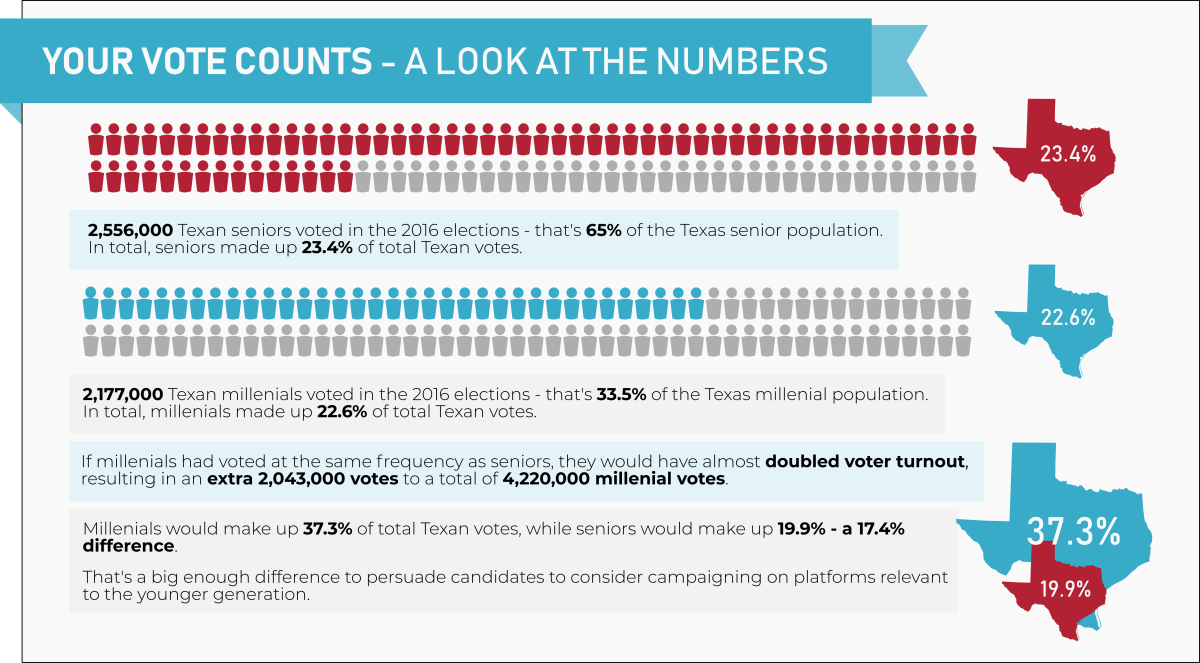While early voting in Texas’ midterm elections is already showing an increase in votes cast, young voters have a lot of catching up to do if they hope to match the typical turnout of the senior population.
Texas voting demographics from the 2016 presidential election show that young voters are underrepresenting themselves. According to the United States Census Bureau, people between the ages of 18 and 34 make up 33.5 percent of Texas’ total population, but they only cast 22.6 percent of the votes for the state during the 2016 election. This is a stark difference to older demographics such as those ages 65 and up, who cast more total votes than millennials in Texas, despite millennials outnumbering them by more than three million in population. If young voters consistently adopted the trends seen in their elders, the difference could be drastic enough to change policy relevant to their interests.
Associate professor Jennifer Mercieca, a historian of American political discourse, said Texas typically has a low turnout rate, and young Texan voters are among the lowest.
Mercieca said census data showed that young people who did not vote primarily refrained for three reasons: they were not registered, they did not think the policies affected them or they did not know how to vote.
For participation to improve, Mercieca said two things have to change.
“Part of the message for a successful political campaign would be both in training — because young voters are inexperienced, they don’t feel confident to do it — and also in convincing young voters that the issues that are being discussed and debated actually do affect them,” Mercieca said.
Issues at the forefront of political discourse such as health care often seem unimportant to young people, but Mercieca said political campaigns could do more to inform this demographic.
“Framing those issues in a way that makes it seem clear that there’s a lot at stake for young people might be a way to encourage young people to participate,” Mercieca said.
Assistant professor in the department of performance studies Zachary Price said it is unfortunate that Texas voting demographics do not represent the state’s population demographics more accurately. This is partly due to low interest in voting, but policy could also improve voter turnout.
Price said a recent example is Oregon’s automatic voter registration law which was passed in 2015 and hailed as a success by the New York Times.
“The most amazing thing is that Oregon just recently passed a new voting law,” Price said. “If you are really talking about having a genuine democracy where everyone’s vote counts, that seems like an example that might genuinely work.”
Price said voter suppression is also a problem that affects voter turnout. While voter suppression might seem distant for the Texas A&M community, students from Prairie View A&M recently filed a lawsuit against Waller County for not providing equal early voting opportunity to university students.
“The unfortunate thing is that suppressing the vote at this point is only going to lead to more conflict,” Price said. “Even as America becomes more diverse, which it always has been, by not allowing people to participate in the democratic system, you are only increasing potential for more unrest.”
Even without voter suppression, there are still many within the Aggie community whose voices are not heard. Such is the case of international and out-of-state students who, while living in Texas, do not have the right to vote.
Hispanic studies Ph.D. student Laura Bernal moved from Mexico to Texas in August and plans to study at the university for five years. Bernal said she understands why she’s not allowed to vote, but feels strange not being able to formally voice her opinion even though she is dedicated to being here.
“On the one hand, I have to abide [by the law],” Bernal said. “When you go to another country you have to respect the laws. But I’m also a taxpayer; I live here; I pay rent, so it feels weird that if they actually decided on legislation that might affect me, I will not have a say in it. You are contributing to life here and society, but you are not allowed to participate in certain things.”
Early voting continues through Nov. 2, and Election Day is Nov. 6. A voting center in L526 of the MSC is open from 7 a.m. to 7 p.m.
Voting age gap leaves young Texans underrepresented
October 30, 2018
Photo by Graphic by Nic Tan
Statistics on population and voting rate were obtained from the U.S. Census Bureau at census.gov.
0
Donate to The Battalion
$1815
$5000
Contributed
Our Goal
Your donation will support the student journalists of Texas A&M University - College Station. Your contribution will allow us to purchase equipment and cover our annual website hosting costs, in addition to paying freelance staffers for their work, travel costs for coverage and more!
More to Discover










